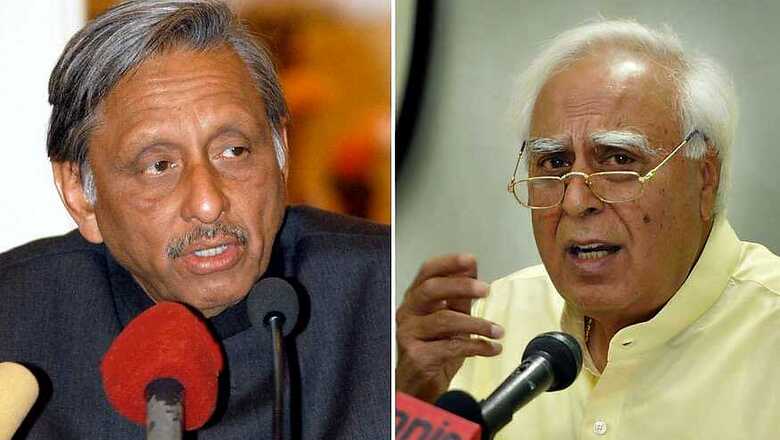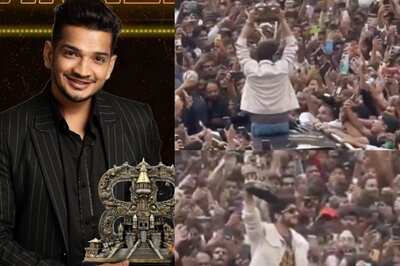
views
Is Kapil Sibal a better lawyer than politician? It could be argued, milords, that he has met with great success in both professions. Yet, with apologies to Mathew 6:24, can a man serve two masters (or mistresses) without annoying both? The honourable counsel did just that, when he sought to defer the Supreme Court hearings in the Babri Masjid-Ram Janmabhoomi case.
The Congress is justifiably piqued with its legal eagle-in-chief. Just when its campaign in Gujarat was perfectly on point, he threw it off course. In seeking a deferment, Sibal was practising a brand of hardline secularism which would have been fine six months ago, but not in the course of the Congress' 'soft Hindutva' campaign in Gujarat.
Likewise, 'motor-mouth Mani' invited suspension for characterising Narendra Modi as “neech”, at a juncture when campaign strategy strictly forbids any personal attacks on the PM.
Rigid secularists like Sibal and Aiyar are not in tune with the Congress-in-transition. Sibal-the-politician wanted to stymie the possibility of a Ram Temple in Ayodhya coinciding with the 2019 general elections. But Sibal-the-lawyer ignored the fact that such a move would not only open up a Pandora's box in legal terms, but undermine his party's electoral prospects in Gujarat.
Sibal could not have asked the Election Commission to attune its calendar to the Supreme Court, so he decided to do the reverse. Clearly, when putting on his political hat in court, he did not see fit to consult the Congress high command, i.e. Rahul Gandhi. After all, he is the party's top legal gun. He has rescued its top leaders from legal embarrassments, be it the late P V Narasimha Rao (the Lakhubhai Pathak case) or party president Sonia Gandhi (the National Herald case).
Whether he was representing the Sunni Waqf Board or an individual litigant is not the point. His stand was certainly in line with that of the Zafaryab Jilani & Co, but not with that of the Congress president-to-be. He should have accounted for the fact that his stature in the Congress hierarchy ensures any statement he makes is deemed to reflect the official view of the party. In a case with such far-reaching implications, even a disclaimer that he was not speaking on behalf of the Congress would hardly suffice.
When not holding constitutional office, lawyers freely represent their party, or ideologically-affiliated entities. That’s exactly what Sibal thought he was doing, but his timing was off, as the Congress is bang in the middle of an ideological churn. Whether its nuanced stand on Hindutva will be limited to Gujarat or carry over to the Assembly elections next year and then to 2019, will depend entirely on the political terrain.
Political parties are choc-a-bloc with lawyer-lawmakers. As lawyers, they are independent entities. Thus, former UPA Law Minister Salman Khursheed can represent rape-accused godman Asaram Bapu in court. Arun Jaitley, Law Minister in NDA I, can defend alleged stock-market manipulator Ketan Parekh, in defiance of the Gujarat state BJP. Sibal can appear on behalf of BJP MP Anurag Thakur in the BCCI case. Harish Salve, who is not a politician but served as Solicitor General in NDA I, can represent 2002 riot victim Bilkis Bano (at the behest of the National Human Rights Commission). It's about professionalism, not merely earning a living outside the political arena.
That said, political inclinations do play a significant role in taking up cases related to Constitutional law. Ravi Shankar Prasad appeared on behalf of Ram Lalla, the resident deity of the Ram Temple in Ayodhya. Sibal likewise represented the All Indian Muslim Personal Law Board in the triple talaq case. Conversely, a legal career can be parleyed into a political one. Sibal was rewarded with a Rajya Sabha seat from Bihar when he represented Lalu Yadav in the fodder scam case.
Ever since Manmohan Ghosh and Badruddin Tyabji, the country's first practising barristers, lawyers have helped shape Indian politics. (Mahatma Gandhi, Muhammad Ali Jinnah, Sardar Patel, Nehru Sr & Jr and so on.) The current generation must tread the fine line between political office and legal practice, if they want to succeed at both. Therein rests the case, milords!
















Comments
0 comment